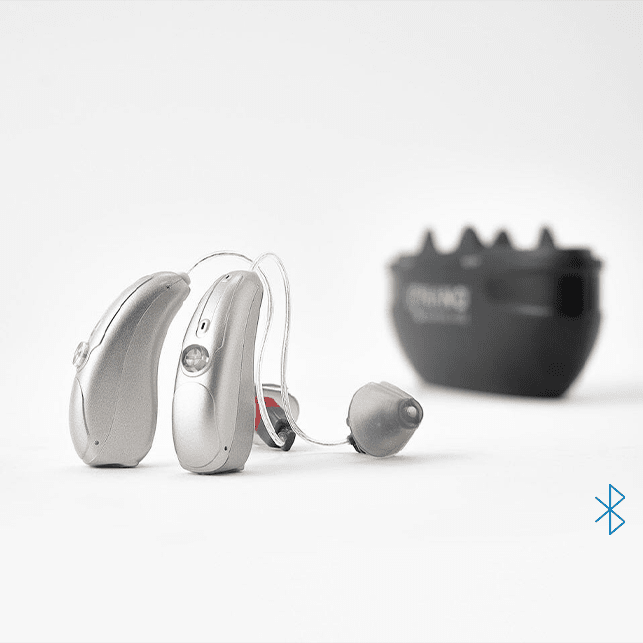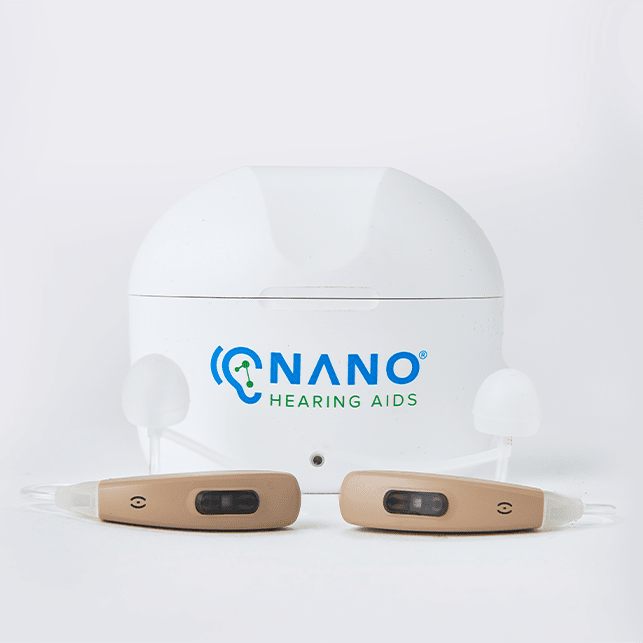Key Takeaways
- Choose quieter environments for conversations to minimize background noise.
- Position yourself directly in front of the speaker to enhance your ability to listen and read lips.
- Choose a hearing aid with advanced noise reduction technology and directional microphones.
Tips to Hear Better with Background Noise
If you suffer from mild hearing loss, hearing clearly in environments with background noise can be a significant challenge, especially in social settings, busy workplaces, or public areas where multiple sound sources compete for your attention. Here are tips to help you hear better in background noise:
- Position Yourself Effectively - Position yourself so that you can see the speaker's face. Lip reading and visual cues will significantly enhance understanding.
- Limit Group Sizes - In social settings, smaller group sizes can help reduce the overall level of background noise and make conversations easier to follow.
- Request a Quieter Table - When dining out, ask for a table away from the kitchen, bar, or any large groups that could contribute to higher noise levels.
- Take Listening Breaks - Background noise can be mentally exhausting. Giving yourself short breaks in a quieter space can help reduce listening fatigue.
- Communicate Your Needs - Don't hesitate to let others know that you have difficulty hearing in a noisy environment. People are generally willing to help by speaking more clearly or moving to a quieter location.
- Practice Mindfulness and Stress-Relief Techniques - Stress and anxiety can worsen your ability to process sound. Techniques that reduce stress, like deep breathing or meditation, can improve your overall listening experience.
- Engage in Hearing Exercises - There are several exercises and games designed to improve your brain's ability to distinguish speech from noise. Regularly practicing these exercises can enhance your auditory processing skills over time.
- Use Directional Microphones - Many modern hearing aids, such as Nano Audacity® RIC, come equipped with directional microphones that can help focus on the sound coming from in front of you, reducing the impact of noise from other directions.
- Use Noise Reduction Features - Activate noise reduction features on your hearing aids if available. These settings are designed to minimize background noise and make it easier to focus on speech.
- Consider Frequency Modulation (FM) Systems - FM systems are particularly useful in noisy environments like classrooms or conferences, as they transmit sound directly from a microphone to your hearing aid.
- Take Advantage of Smartphone Apps - There are apps available that help filter out background noise and amplify speech.
- Use Closed Captioning - In situations where you're watching TV or attending presentations in noisy places, closed captioning will help you catch every word.
- Maintain Your Hearing Aids - Regular maintenance of your hearing aids is crucial. Ensuring that they are clean and functioning properly can significantly improve their performance in noisy settings.
NANO Hearing Aids are FDA-registered, Class I devices. Our OTC hearing aids are designed for individuals over 18 years of age with perceived mild to moderate hearing impairment. With prices starting at just $297, they offer a viable solution for those looking to improve their hearing without breaking the bank.
How Nano OTC Hearing Aids Help You Hear Better with Background Noise
Nano CIC Digital OTC rechargeable completely-in-canal hearing aid

At Nano, we offer a range of FDA-registered OTC hearing aids that were designed especially for adults with perceived mild to moderate hearing loss. Our completely-in-canal models, such as CIC Digital, are nearly invisible and can be self-fitted using a set of ear tips of different sizes.
These hearing aids have a rechargeable battery, which lasts up to 12 hours, and a portable charger, so you can charge on the go. While the devices have simple push-button control and easy set-up, their advanced features, such as powerful feedback cancellation and background noise management, make it easier for you to hear better in social situations.
Advanced Noise Reduction Technology
This technology works by distinguishing between speech and noise, then reducing the volume of the noise, not the speech. This means that even in a crowded place, the voice of the person you're talking to will be amplified, while the background chatter is turned down. The result? You can focus on the conversation at hand without the exhausting effort of trying to filter out the noise yourself.
Directional Microphone Systems
These microphones are designed to pick up sounds from a specific direction—usually where the wearer is facing—while reducing noise from other directions. This is particularly useful in situations where you're facing the person you're talking to, like across a dinner table.
Tinnitus Masking Features
Background noise isn't the only thing that can interfere with hearing. Tinnitus, often described as a ringing in the ears, can be just as disruptive. Fortunately, many hearing aids come with a tinnitus masking feature. This plays a soothing sound that can help distract your brain from the tinnitus, making it easier to focus on external sounds. For instance, the sound of ocean waves or soft white noise can be played through your hearing aid to counteract the ringing. It's like having a tranquil soundtrack to accompany you throughout your day, helping you to hear what you want to hear.
Remote Control and Smartphone Connectivity
Many modern hearing aid models can be controlled remotely via a smartphone app. This means you can discreetly adjust your hearing aid volume or switch between presets with just a few taps on your phone's screen. Moreover, some hearing aids, such as our Audacity® RIC model, can connect directly to your smartphone, TV, or music player, streaming audio straight into your ears. This direct connection can make listening to your favorite shows or songs a much more enjoyable experience, without the interference of background noise.
Nano Audacity® OTC rechargeable hearing aid

If you have perceived mild to moderate hearing loss and are looking for an affordable and discreet OTC hearing aid, browse our product range. By opting for Nano Hearing Aids, you’ll be able to improve speech understanding in noisy environments without anyone even noticing that you’re wearing a hearing aid!
If you have any questions about our model range, insurance coverage, or would like to find out if Nano Hearing Aids are a suitable option for you, contact our call center at (888) 310-6266.
Frequently Asked Questions (FAQ)
What Makes a Listening Environment Challenging?
Several factors contribute to a challenging listening environment:
- High levels of ambient noise, such as traffic or multiple conversations.
- Poor room acoustics, where sound bounces and creates echoes.
- Distance from the sound source.
- Competing sounds, like music or announcements, that distract from the primary source.
How do hearing aids help you hear with background noise?
Hearing aids are equipped with features like noise reduction technology and some with directional microphones that help amplify speech while reducing background noise. This allows wearers to focus on conversations without being overwhelmed by surrounding sounds.
Can you train your brain to hear better in noise?
Yes, through auditory training, you can train your brain to distinguish speech from noise more effectively. This can be done with the help of specialized apps or by practicing in real-world scenarios.
How Do Directional Microphones in Hearing Aids Work?
Directional microphones are a key feature in many hearing aids designed to help users hear better in noisy environments. They work by focusing on the sound that comes from in front of the wearer, which is typically where a conversation partner would be. The microphones can reduce the sound coming from other directions, which is usually noise.
Here's how it works: the hearing aid uses two or more microphones to pick up sound. The sound signals are then compared in real-time. If a sound, like background chatter, is picked up equally by both microphones, the hearing aid recognizes it as noise and reduces its volume. If a sound, such as someone talking to you, is stronger in the front microphone, the hearing aid amplifies it.



